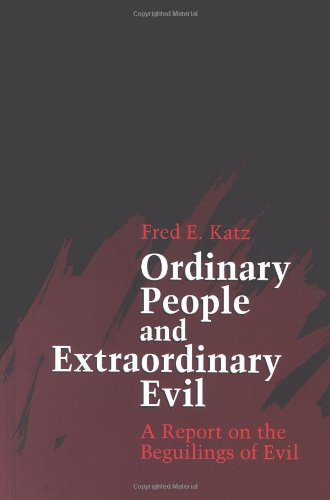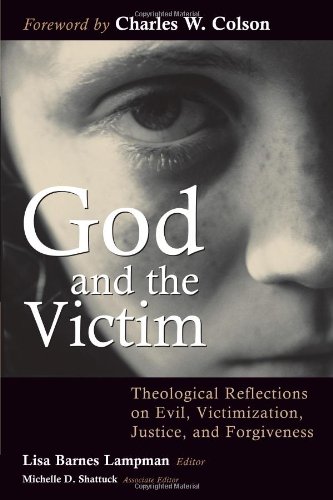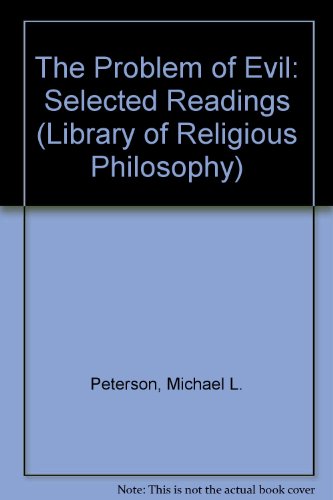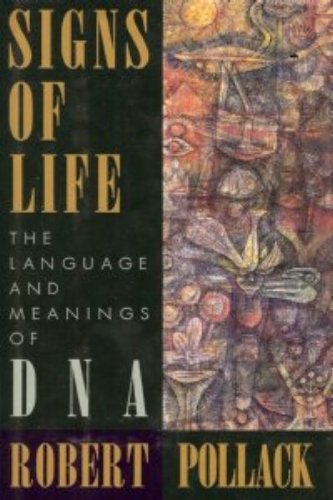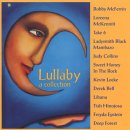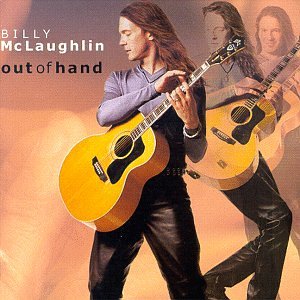Robert Pollack, Rami Nashashibi, Lisa Lampman, et al.
The Problem of Evil
Many around the world labeled the events of September 11 as “evil.” President Bush in his recent State of the Union speech described “an axis of evil.” But what does the word mean? It is a subject of enduring theological debate, even of scientific argument. It drives to the heart of the question: What does it mean to be human?
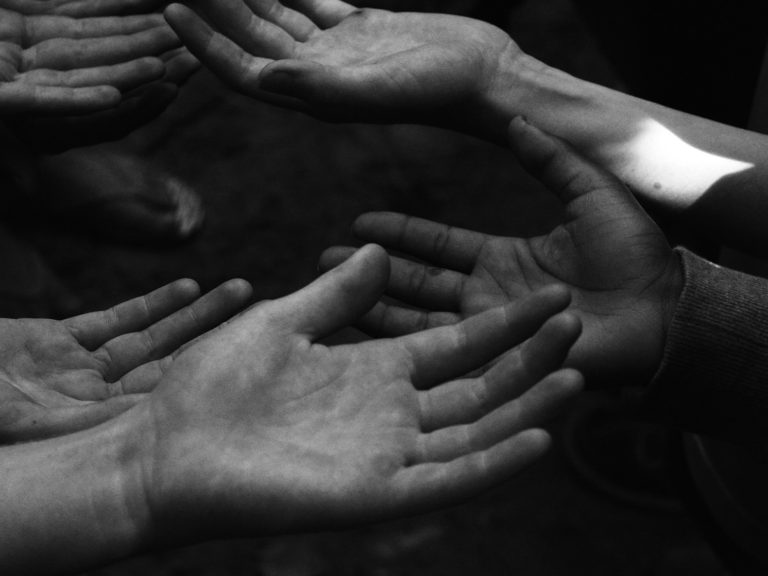
Image by McKenna Phillips/Unsplash, Public Domain Dedication (CC0).
Guests
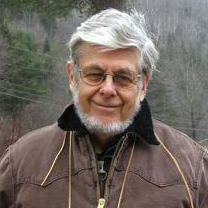
Robert Pollack is a biologist and director of Columbia University's Center for the Study of Science and Religion.
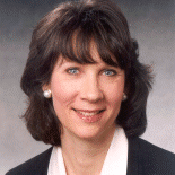
Lisa Lampman formerly of Prison Fellowship, a crisis worker who responds to school shootings.
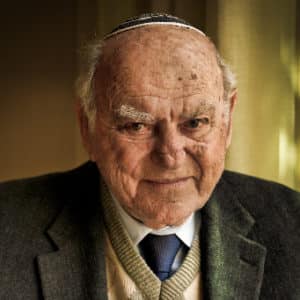
Leon Weinstein was a Holocaust survivor. He was one of the last living fighters from the Warsaw Ghetto uprising.
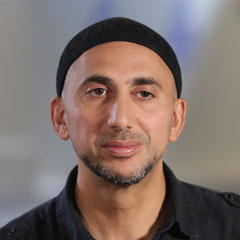
Rami Nashashibi is founder and executive director of the Inner-City Muslim Action Network (IMAN) in Chicago. He was named a MacArthur fellow in 2017 and an Opus Prize laureate in 2018.
Transcript
KRISTA TIPPETT, HOST: I’m Krista Tippett and this is First Person: Speaking of Faith . Today, “The Problem of Evil.”
The word “evil” entered our national vocabulary in a new way after September 11th. Over a year later, there was a rash of new books on evil, and this word is again being invoked to justify military action against Iraq. Here is President George W. Bush speaking on October 7th, 2002.
PRESIDENT GEORGE W. BUSH: Terrorist cells and outlaw regimes building weapons of mass destruction are different faces of the same evil. Our security requires that we confront both, and the United States military is capable of confronting both.
MS. TIPPETT: But evil is not a concept which can be addressed by politics and military action alone; it is a subject of enduring theological debate, even of scientific argument. It drives to the heart of the question what does it mean to be human? And the existence of evil is sometimes seen as the greatest challenge to religious faith, so much so that it has been called the “rock of atheism.” For if there is a good and omnipotent God, how can evil and the suffering it causes be explained?
This hour, we’ll speak with people who confront evil not in a remote political context but in their lives and work. You’ll hear the voices of Holocaust survivors, a crisis worker who responds to school shootings, a biologist and others addressing this question from their perspectives of faith.
The Merriam Webster Dictionary defines evil as “morally reprehensible, sinful, wicked, causing harm.” But what is the difference between doing wrong and doing evil? In the most influential popular work on evil in modern memory, the 1985 book People of the Lie, psychiatrist M. Scott Peck argued that evil defies definition because it is one of the basic mysteries of life.
M. SCOTT PECK: It is a reflection of the enormous mystery of the subject that we do not have a generally accepted definition of evil. Yet in our hearts I think we all have some understanding of its nature. Evil is in opposition to life. It has, in short, to do with killing. Specifically, it has to do with murder — killing that is not required for biological survival. Evil is also that which kills spirit. Evil, then, for the moment is that force residing either inside or outside human beings that seeks to kill life or liveliness.
MS. TIPPETT: September 11th provided a riveting example of destruction, which many of us named evil. So how are we to live with evil if we acknowledge it as a reality in this world? We begin with a Muslim voice.
Rami Nashashibi is a 29-year-old Palestinian American. His parents were, as he describes it, secular Muslim and so was he until his college years. He discovered in Islam a home for his intellect and his passion for social justice. In 1995, he founded the Inner-City Muslim Action Network. As he completes doctoral work in sociology, he also spends his days with young people who are struggling with poverty, drug abuse, gangs, and domestic violence in the ghettos of Chicago’s South Side. He visits teenagers who’ve gone to prison as well as the victims of crime.
So when Rami Nashashibi reflects on evil, he does so in a troubled American context, but his definition of the word is nuanced by his Islamic worldview. When he thinks about the nature of evil, he believes he must look first inside himself.
RAMI NASHASHIBI: Translation is a very big problem here, at least in Islamic cosmology because the word evil in English, I think, connotes a lot of things that the word in Arabic may not connote.
MS. TIPPETT: Tell me a little bit about that. I mean, what is the word in Arabic and what are the differences?
MR. NASHASHIBI: One of words used is “shar,” and Muslims often recite this word, for example, when they seek refuge. We have a verse, we have an invocation that says [speaks Arabic], which means, “I seek refuge in Allah.” And if we were to use the translation evil, it’s “from the evil of our own selves.” In my mind, in terms of how we work with other human beings, it’s supposed to be an element that puts us in check.
MS. TIPPETT: Right.
MR. NASHASHIBI: That somehow suppresses a tendency for sometimes religious arrogance among various faith traditions, whether it be Muslims, Christians, Jews, or anyone. The whole holier-than-thou syndrome, which can only be perpetuated if one really begins to think that they are somehow — obtained a level of goodness and that someone else is categorically evil. And that type of dichotomy, absolute dichotomy, really cannot exist in Islam between human beings, but we really don’t feel like that is in the realm of human capability to determine. And if it is at all to be determined, that would be by a much higher order, a divine order by Allah, you know, God.
MS. TIPPETT: It does seem that when we talk about evil, especially in our public dialogue, we tend to be talking about someone else or something external.
MR. NASHASHIBI: Definitely. And I think, actually, the axiom is to be a million times harder on one’s self than you are on others. And if one were to really be true to that principle, then it would be really hard not to find evil, the quote/unquote “evil” that we’re so sometimes eager and willing to superimpose on others in society in ourselves. Particularly when we don’t consider the circumstances or environmental factors that those so-called evils emerge out of, such as the inner-city ghetto or something along those lines.
MS. TIPPETT: But the hard question that arises is does that let people off the hook? Does that allow this kind of modern phenomenon of everyone’s a victim so you can’t hold them accountable?
MR. NASHASHIBI: There has to be accountability. You know, the foundation of justice in many senses, I think, is accountability. But we have to really be very principled and sincere about accountability in all its forms. We need to begin to expand our definition of accountability. When I drive down Lakeshore Drive and I see the Gold Coast and I go shop at Treasure Island and I see Cabrini Green, or what’s left of it, which is one of the housing projects here in Chicago within a mile of that plush oasis, and I realize that there’s this serious disparity within my society that I live in and I benefit from, I have to begin to hold myself accountable. And ultimately, that accountability should drive me to seek a fair ends.
MS. TIPPETT: And, you know, there is this term, this theological and sociological term of systemic evil, such as racism or poverty.
MR. NASHASHIBI: Correct. Yeah. And I think that needs to be dealt with. I cannot — whether it be as a Muslim or another active participant in the society cannot help but feel that we cannot look at those things in a vacuum. That is simply not going to get to the bottom of why sometimes this violence and this hatred exists in the world and if that’s our concern, you know. And I think we really need to be clear about what our point of departure is. And there should be a question, a spiritual, a humane question, that resonates in each and every one of us.
I made a point to pick up The New York Times every day since September 11th and read the names of every one of the victims. And I kept thinking in my mind what would that be like if I were to be able to do that for every victim of this type of violence throughout the world? To be able to try to picture these people. And how — how would we be able to respond? How would we feel accountable for our actions?
MS. TIPPETT: For you as a Muslim with an understanding of Allah as merciful and compassionate and absolutely sovereign, where is God in the midst of these problems, these systemic evils, if you will? Do you ask yourself that question? And if you do, how do you answer it?
MR. NASHASHIBI: Well, I have one brother that we work with that has a kind of way of making the expression that, you know, Allah is the supreme shot caller of the universe and has always been in charge and always will be in charge. And, you know, as Muslims we do believe that and always will believe that and don’t believe that for any minute somehow his dominion has subsided in any way or form. But the evil that we see around us are the consequences — whether they be systemic or they be from our own selves — at the end of the day are consequences of human actions, human systems, that may be imperfect as we are imperfect.
So the merciful God and his mercy is still here. It allows us to get up in the morning and I believe it allows us to breathe and allows me to walk. It allows me to think. It allows, you know, untold acts of kindness throughout the world to occur and all those emanate from a supreme metaphysical source of goodness which is, in the Muslim worldview, Allah. And that has not subsided in any way, and I think September 11th in many ways reaffirmed that.
MS. TIPPETT: One last thing. You said earlier that it’s sometimes hard to translate, and I believe that that’s true of sacred language in general, but very especially true of the Qur’an and Qur’anic Arabic. And I’m wondering if, as you confront good and evil every day in Chicago, and you’re thinking about the wider world, is there a passage from the Qur’an or a prayer or a blessing that you might just say for me now and tell me, you know, what it means and why it’s important to you in this context?
[Mr. Nashashibi Speaks Arabic]
MR. NASHASHIBI: Which is, “Have mercy on that which is on earth so that which is in heaven can have mercy on you.” And I try to recollect and think about that aspect of the message of Islam because it’s firmly grounded in one of the supreme characteristics of Allah in the Islamic cosmological worldview, which is Al-Rahman, the Most Merciful.
And definitely in a time like the one we’re living, I think we, as human beings, need to constantly remind ourselves of this. As I work in the inner city and as I interact with people, I think sometimes the fact that that message has been unfortunately somewhat either minimized or cynically dismissed becomes very apparent in the harsh realities of our lives, whether they be in the inner cities and the ghettos of Chicago or whether they be in the ghettos of Ramallah, whether they be in the refugee camps of Muslims throughout the world, this aspect of our faith traditions as a Muslim I try to fall back on.
MS. TIPPETT: Rami Nashashibi is founder and director of the Inner-City Muslim Action Network.
I’m Krista Tippett, and this is First Person: Speaking of Faith . Today, “The Problem of Evil.”
READER: Do not repay anyone evil for evil but take thought for what is noble in the sight of all. If it is possible, so far as it depends on you, live peaceably with all. Beloved, never avenge yourselves but leave room for the wrath of God; for it is written, “Vengeance is mine. I will repay, says the Lord.” No, “If your enemies are hungry, feed them; if they are thirsty, give them something to drink; for by doing this you will heap burning coals on their heads.” Do not be overcome by evil but overcome evil with good.
MS. TIPPETT: This passage from the 12th chapter of the New Testament Book of Romans is critical for Lisa Lampman as she works with victims of violent crime. In situations of unspeakable despair, she has discovered that simply invoking the word evil has practical power. Lisa Lampman worked on the Reagan/Bush campaign of 1984 and later joined Charles Colson’s Prison Fellowship. In 1992, she became president of a new initiative of Prison Fellowship, Neighbors Who Care, a national organization to equip churches to meet the needs of the victims of crime.
She told me of one of the most harrowing settings in which she did crisis counseling: the 1998 shooting at a middle school in Jonesboro, Arkansas. Five people were killed and 10 others injured by two boys ages 11 and 13.
LISA LAMPMAN: They set up a place on a hill outside the school, rang the school bell to identify an emergency and all the kids came out into the schoolyard, and they started firing just like you would fire at a shooting range. And a number of children and a teacher died because of that.
You saw just pain and anger and fear on everyone’s face. And the first question that was — after we did a short presentation, the first question was raised by a young girl probably about the age of those who had done the shooting and said, “Tell me, just tell me why this happened.” And of course we didn’t have an answer.
MS. TIPPETT: You know, when those planes crashed into the World Trade Center, we were immediately as a nation using the word evil to describe the violence that had been. I wonder, though, in a context like a school, a community, is it harder to label people as evil because everyone knows them? They have faces and stories, and the story comes out of what went wrong in their lives.
MS. LAMPMAN: Of course it is. I was talking to one of the children who said that they had just invited one of the boys who perpetrated the shooting to a birthday party, and he was normal and fine and, you know, had no indication that he was capable of such acts. So, of course, it was hard to name those children evil. And I’m not advocating that we do that. But certainly what they did destroyed lives. Not only did it destroy lives, the lives of those who were killed, it destroyed families. It destroyed the sense of safety in a community.
MS. TIPPETT: So the fact that there was so much destruction and so many kinds of destruction is what made it evil in your mind. And also it sounds like there’s some mystery in it, that somehow the incomprehensibility, the why question, is also what elevated it to something you would call evil and not just something that’s wrong and bad.
MS. LAMPMAN: What I also saw was that in working with the families, people who had witnessed it or were affected by it, some of the rescue workers, some of the doctors and the nurses who responded at the hospital, they wanted you to come around and name it as evil. They didn’t necessarily say that the people who did it were evil but they said the action was evil. And in many cases, just to name something evil was very comforting for the victims.
MS. TIPPETT: And why is that?
MS. LAMPMAN: I think we might be setting up ourselves to that spiritual realm of evil and good and that our hope is, is that good overcomes that evil by evoking those words.
MS. TIPPETT: I just want to ask you how you respond to our culture’s fascination with evil and violence. But I’m not just talking about horror movies; I’m also talking about how I enjoy a good literary mystery novel. How do you reconcile this fascination with your experience of real-life horror?
MS. LAMPMAN: You know, I think we’re all attracted to elements of evil. Children are attracted to stories with elements of evil. My two-and-a-half-year-old son is fascinated with Snow White and the Seven Dwarves.
MS. TIPPETT: Right.
MS. LAMPMAN: And I remember being so afraid of the wicked queen.
MS. TIPPETT: And there’s a figure like that in all these stories, as there is in …
MS. LAMPMAN: All of these stories.
MS. TIPPETT: … in Lord of the Rings or Star Wars.
MS. LAMPMAN: Right.
MS. TIPPETT: Right?
MS. LAMPMAN: Right. And I think that part of it is we’re fascinated by it because we’re trying to figure it out, even as young children. So I think there’s a natural inclination to some of it that may not be unhealthy if we are trying to think through it and understand it and to really grasp it. I think in some of the more innocent ways, we’re just trying to figure it out and we sense that it is true. There is some evil and in the fairytales it’s overcome by good.
MS. TIPPETT: Eventually.
MS. LAMPMAN: And we want — eventually, right. But, you know, we struggle with that but we — we intuitively sense that there is a reality beyond that fairy tale.
MS. TIPPETT: Lisa Lampman is based in Washington, D.C.
[Excerpt from “Snow White”]
SNOW WHITE’S EVIL STEPMOTHER: Magic Mirror on the wall, who is the fairest one of all?
MAGIC MIRROR: Snow White.
SNOW WHITE: (Humming to herself).
MS. TIPPETT: This is First Person. How do perspectives of faith suggest that we make sense of evil and live with it? After a short break, Holocaust survivors Leon Weinstein and Natalie Gold. Also, Columbia University biologist Robert Pollack on free will, DNA, and the healing of New York.
I’m Krista Tippett. Stay with us.
This is First Person: Speaking of Faith .
[music: “Quartet for the End of Time” by Olivier Messiaen]
MS. TIPPETT: You are listening to music by Frenchman Olivier Messiaen who was interred in World War II in the Nazi concentration camp of Görlitz. Finding himself captive with other musicians, he composed this piece for them to perform, which he called “The Quartet for the End of Time.”
[music: “Quartet for the End of Time” by Olivier Messiaen]
MS. TIPPETT: The Holocaust can be seen as the most calculated and exposed evil of the 20th century, and yet this very same terror gave rise to the phrase “the banality of evil.” As philosopher Hannah Arendt sat in an Israeli courtroom through the trial of Holocaust architect Adolf Eichmann, she and others, including the psychologists who scrutinized him, were struck by how ordinary he was and technically how sane.
After Eichmann was executed, Arendt was left with a deep sense that while his crimes had been punished, the nature of the evil in which he participated was barely addressed.
Leon Weinstein and his daughter Natalie Gold lost 80 family members, including Natalie’s mother, in the Holocaust. A Jew born in Poland, Leon Weinstein fought the Nazis in the Warsaw ghetto, and out of thousands he was one of only seven people to survive.
When Natalie was 18 months old, Leon and his wife left her with a cross around her neck on the doorstep of a Polish family.
LEON WEINSTEIN: We decided this little angel from 18 months, she must leave no matter what. We are lost. We are already — we are finished, but this little one, little angel, must live.
MS. TIPPETT: After escaping the Warsaw ghetto, Leon Weinstein fought in the Polish resistance. At war’s end he searched for Natalie and found her at a Polish convent where most of the children had died of malnutrition and disease. For Leon Weinstein, now 90 years old, evil is not a big enough word to describe the Holocaust.
MR. WEINSTEIN: This is not evil; this is — I don’t know, this is more than hell. And to survive a thing like this and go on living was a hard proposition.
MS. TIPPETT: Did you believe in God during the years of this horror and …
MR. WEINSTEIN: All the time, but because I believe in God I was thinking God is helping me to — somebody should survive and tell the story.
NATALIE GOLD: I’m reminded of how my father tells the story of some of the things that happened when he smuggled me out of this little town of Radzymin and everyone perished the next day. And we ended up in the Warsaw ghetto and just before the uprising in which my father participated that the observance of the Passover and the thanking God for having come out of Egypt, that took place in whatever manner they could do in the bunkers, that the observation of the religion was so strong. And I think that’s one of the things that helped my dad get through.
MR. WEINSTEIN: I was the organizer, what organized we should conduct the services Passover supper like nothing would deaden. We know the next day, tomorrow, will be here but we forgot about this and we conducted all traditions from A to Z with all the trimmings. Because we believed in God. Maybe will happen a miracle, somebody from us will survive.
MS. GOLD: I do have my first memories in the convent, which many of the children died of starvation. What is evil? People participating in this, people watching, people being bystanders. In this particular situation there were neighbors and friends who turned in their Jewish neighbors for a pound of sugar or a sack of flour. But evil is sometimes merely not lifting a finger. That’s something that I — that I draw deeply from my religion; that I have a real strong sense that we are all God’s partners in making this a better world. And we are all partners of whatever evil force exists in the world when we look the other way.
MS. GOLD: You know, I’m convinced that one of the things that kept my father alive was tremendous, tremendous faith in God, but not so much the faith in God of being saved, as saving the Jewish people. I think that there is something within the Jewish character the telling of the story is very, very important just as we tell the story of Exodus that even in the middle of the destruction or of what people saw as perhaps their last day, that there would be one remnant of a person who would remember the story and tell the story of what happened.
MS. TIPPETT: And is passing on the story and even as you’re describing maybe telling parts of the story that aren’t so well known, is that part of how evil is overcome?
MS. GOLD: Absolutely. Absolutely. I think evil has to be exposed for the fact that it brings nothing in the world. It brings no joy, it brings no future, it brings no renewal. Only good begets good. And I think it’s — the choice of good and evil comes up every day, and I think that’s the human challenge to realize. In other words, the road out of Egypt is never over. The road out of Egypt and the road to becoming slaves to our own less than good nature is a daily task and, you know, it humbles me to think about it. But I also know it’s very real for me.
MS. TIPPETT: Here’s a quote from Solzhenitsyn, the great Russian writer: “If only there were evil people somewhere insidiously committing evil deeds and it were necessary only to separate them from the rest of us and destroy them, but the line dividing good and evil cuts through the heart of every human being and who is willing to destroy a piece of his own heart?” Does that ring true for you?
MS. GOLD: I think that pretty well summarizes the position I have. It’s that in order to understand evil we really have to understand human nature, which is one of the arguments I have for people who think if we could just find Bin Laden it’d be all over. Not so. Not so.
MS. TIPPETT: What is the challenge beyond finding Bin Laden in your mind?
MS. GOLD: Well, you know, the challenge is to realize that three-quarters of the children in this world still go to bed hungry. The challenge is that there are millions and millions of people who suffer terrible diseases because we can’t get some vaccine that costs five cents to them. Those are the evils of the world. Sometimes we concentrate on the little ones and really ignore the bigger ones.
MS. TIPPETT: That list that you have just drawn is a list that we’re familiar with, but having heard you say just a few moments ago that we also commit evil in turning away, it feels like more of a condemnation to me in the context of this conversation I’m having with you, more urgent.
MS. GOLD: Mm-hmm. Mm-hmm.
MS. TIPPETT: The fact that we hear these facts recited and we think they have nothing to do with us.
MS. GOLD: It is a condemnation and yet, you know, I also know that all of us can only do so much and there are, you know, being aware of it makes me angry.
MS. TIPPETT: I’m Krista Tippett. Natalie Gold and her father, Leon Weinstein, survived the Warsaw ghetto but lost 80 members of their family, including Natalie’s mother, in Nazi Poland. Natalie spent several years in a convent orphanage where most of the children died. In recent years, she has organized meetings in Germany between second-generation Holocaust survivors and the family members of former Nazis.
MS. GOLD: They’re wonderful people with tremendous amount of remorse and a tremendous need for restitution and reparation, and I think this is the only thing we can do, is to repair the world, to see whether the people who were the perpetrators and the victims can get together and begin to dialogue and begin to see how the perpetrators probably suffered a great deal too.
MS. TIPPETT: You know, Christians will talk about the imperative to forgive. You just used the phrase “repair the world” and that’s a very Jewish phrase.
MS. GOLD: You know, it’s really interesting you should bring that up because I’ve just come back from a weekend retreat with fellow Holocaust survivors, children Holocaust survivors, and the retreat took place at Holy Spirit Convent.
MR. WEINSTEIN: Your environment.
MS. GOLD: My father was joking.
MS. TIPPETT: That’s right.
MS. GOLD: And as the bells were tolling I thought, oh, here I am. And there were a group of ministers there and we began a dialogue and they kept using the word “forgiveness.” And I really balk at that word. It’s a very Christian concept, I really began to realize. That, you know, you’ve got to forgive, you’ve got to forgive. I’m not sure I understand what that means, not from where I come from. And I think you’ve just brought it together for me. Maybe our concept is one of repair. And maybe it means something very similar, because forgive tends to, to me, to mean that you’ve forgotten something.
MS. TIPPETT: Right. Forgive and forget.
MS. GOLD: Forgive and forget. I will never forget.
MR. WEINSTEIN: I’ll never forget.
MS. GOLD: So maybe the only thing we can do is be very conscious of that and try to repair the world. And for me, this has an action to it.
MS. TIPPETT: Natalie Gold and Leon Weinstein live in Los Angeles.
This is First Person on the Problem of Evil.
The translated words of a Serbian paramilitary on how he killed Albanians in Kosovo in 1999:
TRANSLATOR: Early on, the Serbian secret police were transporting Albanians safely through the border by hiding them in the trunk. They charged them $2,700. When the guys in my unit heard about this, we started doing it too. Later, after the native bombing got worse, I wouldn’t bother taking the Albanian to the border; I would just take their money and kill them. I couldn’t care less for the Albanians. None of us cared. They’re less than human. They’re shirt.
MS. TIPPETT: Theologians identify two kinds of evil: natural evil such as disease in the human body, and the moral evil which flows from the conscious choices of human beings.
ROBERT POLLACK: I think of the evils that we choose to do by free-will choice, the one which closest resembles natural evil is the dehumanization of another person for whatever reason.
MS. TIPPETT: That was Robert Pollack, a biologist and director of the Center for the Study of Science and Religion at Columbia University and the author of Signs of Life: The Language and Meanings of DNA.
DR. POLLACK: One of Hitler’s slogans was that politics is applied biology, and there were many, many cases and representations of the problem of Europe and the problem of Germany being, not the presence of Jewish people, but the disease of Jews. This happens in the case of Ireland. It happens in the case of Israel and Palestine. It happens in the case Rwanda. People who differ to our eyes very little seem to make those little differences into justification for saying of each side the other is not quite human.
MS. TIPPETT: Robert Pollack reconciles the theological problem of evil in a classic way. God is good and this world has been endowed with free will. We can’t lay the awful choices which human beings make at God’s doorstep.
As a scientist, Robert Pollack works to heal disease. As an observant Jew, he accepts that he will never fully understand the mystery of decay built into human life. I asked him how recent insights into the human genome might inform our understanding of evil. Are human beings biologically predisposed with a capacity for doing violence to others?
DR. POLLACK: I consider it as the first matter of my own belief that absent free will, we are not angels but we are beasts. And that it is only the free-will choice to not be a beast that allows the possibility of civilization in any sense. So insofar as when you say inherited you imply inevitable, instinctual, uncontrollable by choice, I have to say that it can’t be. Just by virtue of the fact that we’re having this conversation and we’re not killing each other.
MS. TIPPETT: Yeah, but you’ve turned it around, actually, because I think that maybe the assumption is that we should be good and are mostly good but things can go bad. And you’re saying that, in fact, free will is our way to becoming human.
DR. POLLACK: Correct. I am saying precisely that. People who believe that the decoding of the human genome arrogates to us any godly powers miss the point of what the DNA of people or other mammals encodes. It encodes not a person but the capacity to become a person in the case of our species. The becoming of a person is an intrinsically social event from the moment of birth, if not before. The worst torture a person can give to another person is not the inflicting of pain but the inflicting of total isolation.
That’s the biology which is encoded in our DNA. It’s the biology of a strategy of species survival that requires an absurd amount of energy and risk on the part of parents for the survival of a very small number of progeny. We are at the extreme end of biological strategies for survival through natural selection.
So I think the essence of our human-ness and the essence of our difference from other living things does not lie in our DNA except insofar as the DNA encodes us to be learning people, to be capable of socialization, to need each other, to need constant contact with each other. We learn to be safe and we learn to be at risk. We learn to be happy and we learn to be threatened by experience, not by DNA.
We have in the DNA the capacity for those things, just as we have in the DNA the capacity for an architecture of brain and muscle and throat and mouth and nose, out of which emerges language but not meaning.
MS. TIPPETT: All right. So here’s an implication of what you just said that is surprising to me. That if free will is in fact what gives us a choice not to just be beasts, then when we look at terrorism, for example, rather than thinking of that as an extreme and horrible choice, you might see that as an abrogation of our free will as human beings.
DR. POLLACK: Nope. I’m not even going to be backed into that far. They were the very opposite of a judge and a jury and a verdict and a rule of law. They acted in the most profoundly lawless way by not caring who died. Right?
MS. TIPPETT: Mm-hmm.
DR. POLLACK: That fact is, I believe, their choice. That’s the criminality of it. That is the evil of it. In this case, I guess to the extent you were to show me that somebody had no choice, I would say there is no evil in what they did. That’s how strongly I feel about this.
MS. TIPPETT: Mm-hmm. In your book Signs of Life, you used as a visual analogy for DNA the Twin Towers of the World Trade Center and you said …
DR. POLLACK: Scares the here out of me to realize that — oh, man.
MS. TIPPETT: Yeah. You said, “Imagine if one day they were only one or if they divided and then suddenly they were four.” And now there are none and I would be very curious if you could talk specifically about how that changing living landscape, you know, reflects or further informs your imagination as a scientist who is also a person of faith.
DR. POLLACK: Krista, that’s a really tough question because I know the way lower Manhattan looks from the observation tower of the 100th floor of one of those buildings. I can, in my mind’s eyes, see where I grew up in Brooklyn and see where I live in Manhattan from the tower. And the thought that the tower is no longer there and my memory is sort of suspended in midair, no place but in my head, is a terrifying and disturbing thought. But there it is.
One thing that I am very pleased to say is that my neighbors here and in Vermont where my wife and I have a house, have, as President Bush accurately described, tried to make some good of this by taking care of each other more carefully.
MS. TIPPETT: And is there something in that perception of yours which says something about your theology?
DR. POLLACK: That’s a great question. I think it would be very arrogant of me to know that. I think the answer to your question would be yes, in the following sense. I consider my prayers to be ways of saying thanks and these are things to say thanks for. But I do not, therefore, ameliorate in my own heart the knowledge that there are some thousands of people here who will not have full families, as I am fortunate enough to have. And they did nothing in their free-will choices in life except go to work and thereby disappear.
One other last thing I will say apropos my religious sensibilities in this, my wife and I live some five miles due north of the site of the buildings on the Columbia campus and as you probably know, as most people probably know, prevailing winds blew most of the disaster over Brooklyn where I grew up, but not where I live now.
However, there was one day, Thursday, when the winds went north and we noticed immediately. We thought there was something burning, an electrical fire someplace in our apartment house, got concerned, and then realized by looking out the window at the Hudson River that there was that smoke — which is not smoke; it’s more like a white cloud — coming up the river and we smelled it.
And I have to say that my first thought before I thought anything else was that this must be what people living in villages and cities and towns throughout Germany and Eastern Europe smelled and said to themselves, they knew what it was but they couldn’t admit it. This was the smell of people as well as concrete in the air. And it was terrible.
MS. TIPPETT: You are listening to biologist Robert Pollack, who directs the Center for the Study of Religion and Science at Columbia University. I asked him what his Jewish tradition suggests about the presence of God when evil happens.
DR. POLLACK: There is a blessing for every event in a Jewish life, and they all take a very similar starting form, “Blessed are you, God of the universe, for,” dot, dot, dot. Creator of the universe. And in the case of what is considered to be bad news — that’s the usual euphemistic way to say it, bad news — one says, “Blessed are you, God of the universe, the true judge.”
Now, that is an affirmation of faith that what makes no sense to me makes sense in the large scale in God’s eyes. It is the most difficult thing for me to say. I don’t understand entirely what I’m saying when I say it. So I consider that my ancestors and the sages and the people whose writings crystallize out as the cannon of our ritual have initially understood the impossibility of saying this is justifiable but have set aside their need to understand it and allowed themselves to feel the pain of it.
I think if one ever attends the home of a Jew in mourning for seven days, one sees how the ritual is extremely careful to remove all obligation from that person, even to talk to someone, and how obligatory it is for everyone else who knows that person to attend that person for seven days, not asking them to do anything — anything. So that’s how we do it. We do it by living both sides of the coin. The one being the absolute commitment to this world being just in religious terms, despite the evidence, and the absolute capacity to fully express the pain of real loss. I think that every formed religion does both.
MS. TIPPETT: Mm-hmm. I know that you are concerned now about the healing of your city, of New York, and you’re finding ways that you can work on that, places that you can work. Is that also a way that you as a person of faith think about approaching, sort of living with, the reality of evil? Overcoming it in a sideways direction, if you will?
DR. POLLACK: I guess I will give you an un-intuitive answer to that. I’m very much less patient with the forms of organized religious observance in my tradition since September 11th. I’m very much less patient with synagogues as community centers and with ritual diluted of its religious content so that it can be more comfortable. I’m very much less patient with collegiality in place of prayer. It seems to me this event demands first humility and then the commitment to make choices which are more caring of everyone around one. Not just family but everybody. I don’t see enough religious impetus to behave better.
I think that’s the best honoring of the extraordinary, incomprehensible goodness of people who, for their job’s sake or for their honor’s sake or for their blessedness sake, chose to go back into a place which everyone else was told to flee from for their lives and then died.
I don’t know of a more perfect example of doing the right thing at great cost to one’s self than the presumptive behavior of the people on the fourth airplane who, having got word of what had already happened, understood that their lives were forfeit and then chose to save some unknown person by changing the way they would die. It was the perfect mirror image of the terrorists’ intention. The terrorists’ intention were to kill people without knowing them and these passengers’ intention were to save people without knowing them.
MS. TIPPETT: Right.
DR. POLLACK: So there probably is the greatest strongest example I can come up with for what I mean by free will. The terrorists knew they were going to die and made the free-will act to kill strangers. And the people on that fourth plane knew they were going to die and made the free-will act to save strangers. If those people could make that choice, we all have choices we’re not making well enough right now.
MS. TIPPETT: Robert Pollack’s most recent book is The Faith of Biology and the Biology of Faith.
MS. TIPPETT: Earlier in this house you heard Holocaust survivors Natalie Gold and Leon Weinstein, crisis counselor Lisa Lampman, and Muslim social activist Rami Nashashibi. I am struck by the themes of these voices — Muslim, Christian, and Jewish — as they confront evil in the world. As Americans address urgent political and military realities, how might we also take seriously the biblical injunction to overcome evil with good? And what can the compelling Jewish phrase tikkun olam or to “repair the world” mean in practical terms in the world we live in now?
I am also struck by Natalie Gold’s sense, born of bitter experience, that evil can sometimes mean not lifting a finger. That we can be partners in evil simply by looking away. And here Rami Nashashibi’s sensibility as a Palestinian-American Muslim also seems instructive. He knows the connectedness between the ghettos of Chicago, Ramallah, and Baghdad. I am left with the image of him studying the names, faces, and stories of the 9/11 victims in The New York Times. And he asks himself, what would it be like if I were able to do that with every victim of this kind of violence throughout the world?
Finally, Robert Pollack offers the chilling reminder that politics can be a form of applied biology. That is, if we begin to see others as less than human, we can suspend our own moral sense when we destroy them.
Since 9/11, government and media alike have used a vocabulary of hunting terrorists, as if they were prey, animals. The voices of this hour suggest that if, in the name of wiping out evil, we allow ourselves to treat others as less than human, we may be in danger of committing evil ourselves.
We’d love to hear your comments on this show. Please write to us at [email protected]. That’s “M” as in “Minnesota,” mpr.org. You can also send us comments through our website at firstperson.org. You can also call Minnesota Public Radio at 1-800-228-7123.
First Person is produced by Marge Ostroushko and Brian Newhouse. Technical direction came from Tom Mudge, Craig Thorson, Alan Stricklin, and Scott Liebers. M. Scott Peck’s book People of the Lie is published by Simon and Schuster. First Person’s executive producer is Bill Buzenberg.
I’m Krista Tippett.
Books & Music
Recommended Reading
The On Being Project is an affiliate partner of Bookshop.org and Amazon.com. Any earnings we receive through these affiliate partnerships go into directly supporting The On Being Project.






